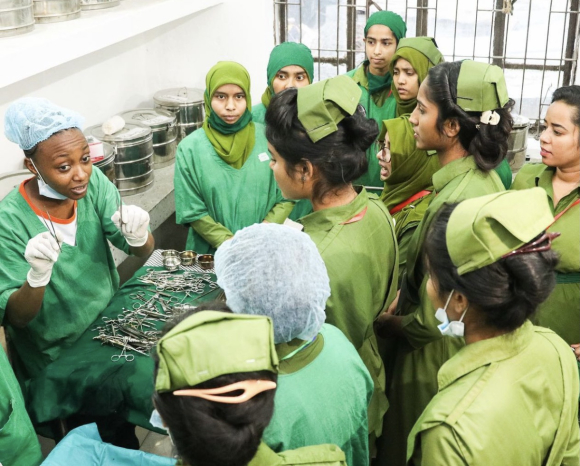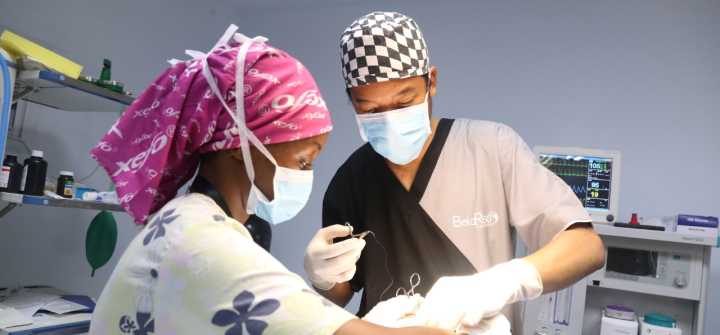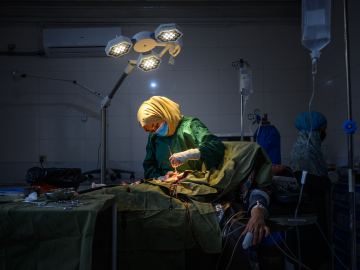Theatre Nurses: The Unsung Heroes in Surgical Safety
Early in my nursing journey, fresh out of school with dreams as vast as an African savanna, I experienced a moment that shook me to my core. During a tense surgery, I sensed that a needle was mishandled. Ignoring the butterflies in my stomach, I summoned the courage to speak up, only to be met with disdain and disregard from those deemed more experienced.
The repercussions were devastating. What began as a whisper of concern escalated into chaos within the operating room, morphing into a discord of panic, blame, and disagreement. Amid this turmoil lay a young mother, her dreams of expanding her family shattered as she was rushed into a hysterectomy.
Witnessing this tragedy unfold before my eyes ignited a fierce determination within me to be a relentless advocate for my patients. I vowed never to let fear silence my intuition or allow hierarchy to overshadow patient safety.
Over 300 million surgical procedures are performed annually worldwide, per the WHO. Over 4 million people die each year following surgery. What is shocking is that over half of these deaths are considered preventable. Millions more suffer severe complications following surgery. What often goes unnoticed is the essential role nursing plays at the heart of patient care within the realm of surgery.
As an operating room nurse with 10 years of experience, I have witnessed firsthand the critical role nurses play at every step of the surgical process, from prepping patients before surgery to post-operative recovery care.
I remember the moment that sparked my nursing career. My mother was gravely ill; her eyes were yellow, and her gallbladder was on the verge of needing removal. The weight of impending loss pressed heavily upon me as we entered the hospital. Yet, it was there, amid the sterile halls and beeping machines, that I encountered angels in human form: nurses. From the moment they welcomed us, their compassion and empathy were palpable. The turning point came when my mother emerged from surgery, her vitality restored. The ability of the nurses to heal the body and soul, and the joy that they radiated, was undeniable. At that moment, I knew with absolute clarity that I had to be a part of this noble profession.
In the surgical domain, nurses are the unsung heroes who organize the elaborate coordination of patient care before surgery. We ensure patients are physically and emotionally prepared by explaining procedures, alleviating fears and anxiety, obtaining informed consent, and collaborating with the multidisciplinary team to prioritize patient safety during surgery.
Nurses are critical to maintaining smooth operations. Surgeons cannot operate without a nurse; anesthesiologists cannot intubate without a nurse’s assistance; cleaners cannot ensure that the hospital is clean and infection-free without the guidance of nurses. Our vigilance ensures sterile instruments, adherence to protocols, and a patient-centric focus.
Then, when a surgeon or anesthesia provider leaves the operating room, they leave the patient's care to the nurse.We monitor vital signs, manage pain, and facilitate a seamless recovery while addressing emotional needs and involving families—all vital for healing.
Although nurses play a critical end-to-end role in patient care, nurses in low-resource settings often lack access to high-quality training and leadership roles; they’re often not involved in quality improvement initiatives. This gap hinders our professional growth and impacts the quality of care we can provide. I appreciate the work to change the narrative by groups like safer surgery nonprofit Lifebox, which offers perioperative nursing fellowships that focus on leadership, research, communication, and advocacy. This initiative is more than just training; it's a redefinition of nurses as critical decision-makers in surgical teams.

Belinda takes nursing students in Bangladesh through a training session during a surgical mission. Photo courtesy of Belinda Karimi Mbaabu.
Through such continuous education, collaboration, and adherence to evidence-based practices, nurses will be empowered to bring positive change in health care outcomes. For example, nurses can lead in implementing the WHO Surgical Safety Checklist in operating rooms and preventing post-op infections by following protocols. They can educate other surgical teams on preventive measures to improve patient safety by avoiding errors such as performing the wrong surgery to the wrong patient or the wrong site.
Safe surgery is not just about the skills of surgeons and anesthesia providers, but nurses as well. Nurses are essential in ensuring safe surgery, prioritizing patient welfare, restoring dignity, instilling hope, and transforming lives—one surgery at a time.
Belinda Karimi Mbaabu, KRCHN, is a registered nurse from Kenya. Her career as an operating room nurse has led her around the world—to countries including Somalia, Rwanda, Angola, and Bangladesh—through the Bela Risu Foundation, dedicated to surgical missions for cleft lip and palate repair. She also collaborates with Lifebox as a nurse trainer, advocating for safe surgery and sharing experiences to save lives in low-resource countries.
Join the 50,000+ subscribers in 170+ countries who rely on Global Health NOW summaries and exclusive articles for the latest public health news. Sign up for our free weekday newsletter, and please share the link with friends and colleagues.
Belinda Karimi Mbaabu at work with a maxillofacial surgeon, performing a cleft lip surgery in Mogadishu. Photo courtesy of Belinda Karimi Mbaabu.





